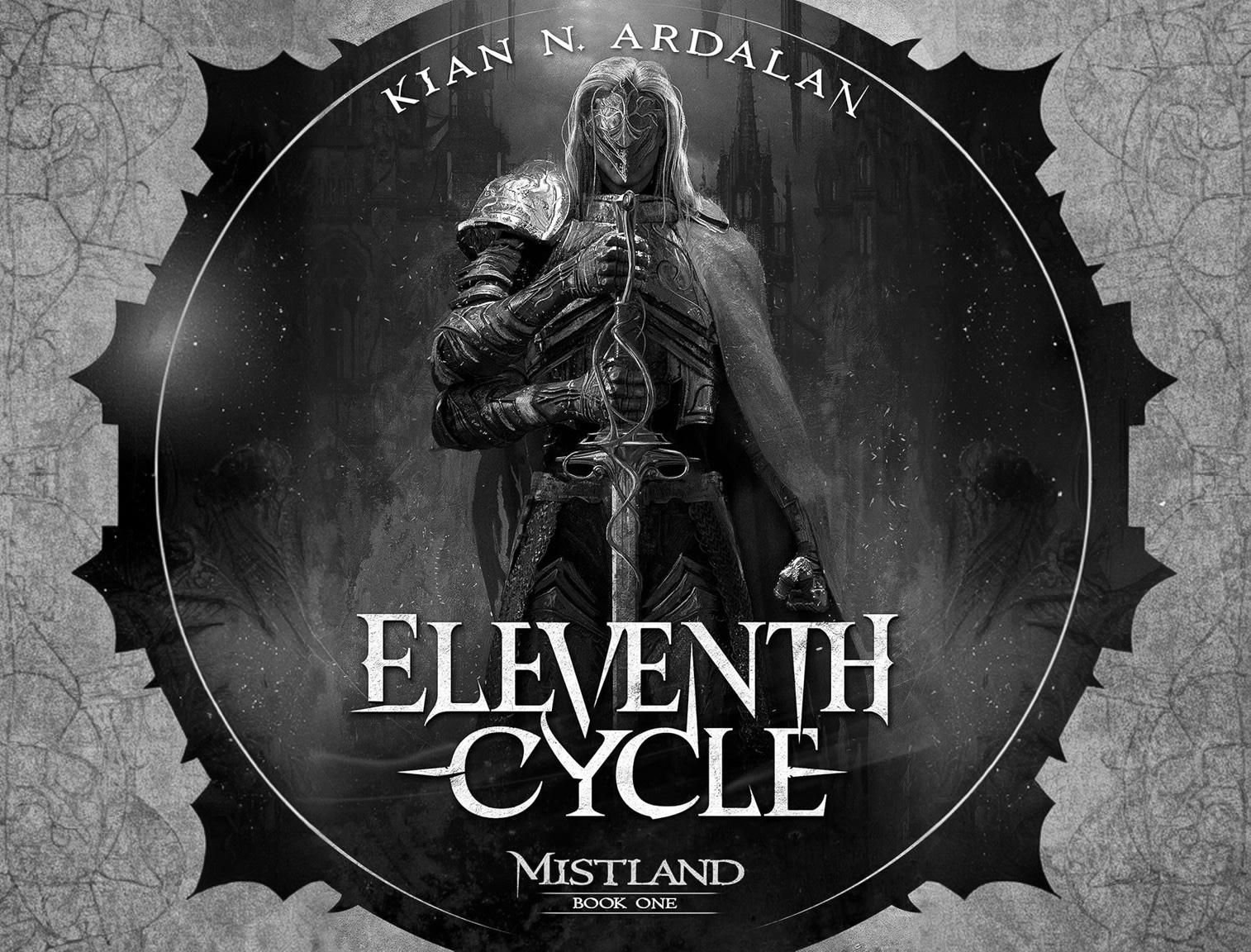
Mistland rises: a journey through Kian N. Ardalan’s Eleventh Cycle
by Kai Ochsen
There are books that entertain, and then there are books that whisper, or rather echo, from somewhere ancient, somewhere weathered, like a forgotten cathedral buried beneath the bones of dead gods. Eleventh Cycle, the first installment in Kian N. Ardalan’s Mistland saga, is not your typical fantasy debut. It’s a labyrinthine, poetic, and punishing exploration of decay, memory, and cyclical ruin, a story that owes as much to the ruined grandeur of epic fantasy as it does to the philosophical sorrow of Dark Souls.
Though Ardalan never states it explicitly in the text, fans of FromSoftware’s work will immediately recognize the fingerprints of Hidetaka Miyazaki all over the pages: fragmented storytelling, a faded age of heroes, a world where death is more ritual than end, and meaning is something the reader must fight to extract.
But to reduce Eleventh Cycle to a Dark Souls homage would be a disservice. This novel is a personal reckoning, filtered through epic fantasy. It’s a long meditation on trauma, rebirth, and identity, woven into a world whose gods are silent, whose truth is obscured, and whose heroes are broken before the journey even begins.
Echoes of the undying
At first glance, Eleventh Cycle offers familiar landmarks: an ancient land (Mistland), a cataclysmic event (the Breaking), chosen children, and a mythic force shaping the world’s destiny. But Ardalan isn’t interested in reassuring tropes or simple arcs. His characters are not vessels for power fantasies; they are broken, limping toward purpose, exiled from comfort and cursed with knowledge.
The very structure of the book, fractured points of view, shifting timelines, elliptical lore, mirrors the architecture of Dark Souls itself. Readers must piece the world together, like archeologists of a crumbling faith. The Mistlands are heavy with dread, but also sacred in their silence. The echoes of past ages linger like ash in the lungs. Time itself feels unstable.
This world is post-truth. What happened in the First Cycle may never be known. Or worse, what is “known” might be a lie, repeated so often it calcified into myth. Sound familiar?
Aesthetic of ruin
What makes Ardalan’s writing stand apart, especially in a market flooded with grimdark and faux-edgy fantasy, is his devotion to tone. There is poetry in his decay. His prose is deliberate, often lyrical, balancing brutality with beauty. Like Miyazaki, he doesn’t scream his themes. He allows them to drift like fog.
Take, for instance, the way Ardalan describes landscapes. There is a reverence for erosion, for the moss-covered ruin, the flaking fresco, the mute temple. This isn’t the industrial dystopia of Blade Runner or the high fantasy of Tolkien. It’s somewhere in between: a sacred entropy, where even the gods have rotted.
This makes the book emotionally demanding. It doesn’t reward readers with cheap catharsis or thrilling battles every few chapters. Instead, it creates atmosphere. Mood becomes worldbuilding. Loss becomes character.
If Dark Souls made you stare at the abyss until it blinked back, Eleventh Cycle hands you the abyss and asks you to carry it.
Philosophical foundations
There’s an existential weight to Eleventh Cycle that feels rare in fantasy. Ardalan explores memory as trauma. Identity as echo. Faith as both salvation and curse. His characters don’t just seek to survive, they seek meaning, often at great personal cost.
This makes the story resonate deeply with the themes of Dark Souls and Elden Ring, where purpose is ambiguous and perseverance itself becomes the only virtue. The gods of Mistland are distant, if they exist at all. Prophecy is murky. Heroism is not guaranteed.
There are no Chosen Ones. Only survivors. And survivors bear scars.
Ardalan’s exploration of cyclical history, as the title implies, suggests a world where events repeat not due to fate, but because memory is faulty and power refuses to learn. This is the tragic loop of humanity. The “Eleventh Cycle” may simply be another mistake, dressed in new myth.
Influence beyond homage
Despite these thematic parallels, it’s important to state: Ardalan is not copying Dark Souls. He is dialoguing with it. While Miyazaki paints with silence, Ardalan uses language. He leans more on psychological depth and internal monologues than the game ever does. The influence is spiritual, not literal.
If anything, Eleventh Cycle stands closer to literary fantasy: the haunted symbolism of Gene Wolfe’s Book of the New Sun, the bleak majesty of Mervyn Peake’s Gormenghast, or even the metafictional layering of Mark Z. Danielewski’s House of Leaves.
It is rare to find a fantasy debut so fearless in its intent. Ardalan doesn’t spoon-feed his readers. He trusts them to endure the weight of his world, and in doing so, makes them complicit in its rebirth.
The future of Mistland
As a first entry in what promises to be a multi-volume saga, Eleventh Cycle plants seeds more than it reaps. Some threads remain unresolved. Some chapters meander, perhaps too long. And for readers unfamiliar with fractured storytelling, the slow pacing might frustrate.
But these are forgivable flaws in a book that dares so much. In fact, they are part of its identity. Like the Soulsborne games it echoes, the rough edges are part of the immersion. Not all answers will be given. Some truths must be earned.
What matters most is this: Ardalan has crafted a world that lives after the end. A world haunted not by monsters, but by memory. And in doing so, he’s created a truly modern fantasy, one unafraid to linger in silence, to question heroism, and to let its readers feel lost.
Because sometimes, that’s where the truth hides.
Verdict:
A stunning, emotionally rich, and thematically ambitious debut. Kian N. Ardalan's Eleventh Cycle does not play by fantasy’s rules, it rewrites them in blood and ash. For fans of Dark Souls, this is the novel you've been waiting for, even if you didn't know it.
If you want to give it a try, you can get it here.